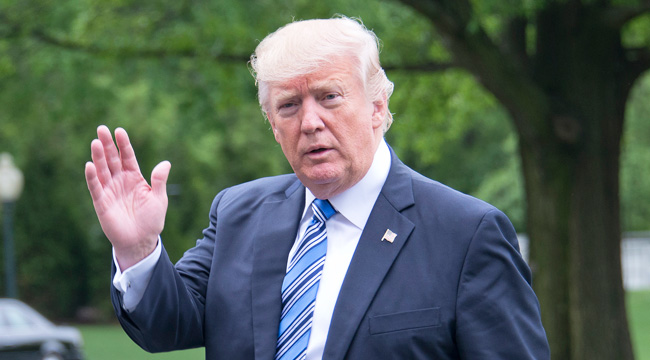
A few months ago, President Trump had a no-good week and retaliated by baselessly accusing Barack Obama of wiretapping Trump Tower. His inspiration was a false Breitbart story that an aide had slipped into his reading pile. Trump also accused the Brits of aiding Obama based upon another fake news story that sourced from a known hoaxster (who spread the theory during a Russian State TV interview). Both accusations were bogus, but how, exactly, does Trump fall into the fake news trap so often? Politico has offered a fascinating report that (if true) details the process.
The report begin with a frustrated Reince Priebus telling staffers to stop dropping fake news into Trump’s reading material. The warning followed after Trump believed a mocked up, 1970s-style magazine cover about how global warming didn’t exist, which was a hoax that had circulated for years online. Nonetheless, Trump was all fired up about media “hypocrisy” and was preparing to tweet his anger, but someone managed to tell him the truth before all hell broke loose (again).
The issue, mostly, is that Trump doesn’t do his own internet research and relies upon a daily binder of clippings from his team. Staffers know this and sometimes use it to their advantage or to have a hand in crafting Trump’s policies, but Trump prefers an “open” method of sharing because he hates structure or something. This has been disastrous:
The consequences can be tremendous, according to a half-dozen White House officials and others with direct interactions with the president. A news story tucked into Trump’s hands at the right moment can torpedo an appointment or redirect the president’s entire agenda. Current and former Trump officials say Trump can react volcanically to negative press clips, especially those with damaging leaks, becoming engrossed in finding out where they originated.
One telling example provided by Politico was how Trump raged against former deputy Chief of Staff Katie Walsh after notorious internet troll Chuck Johnson spawned a fake story about Walsh leaking to the press. Johnson, who says he “tracks the IP addresses of visitors to his website,” told Politico that the White House visited the story’s page frequently. Steve Bannon also spoke to Politico to defend Walsh and downplay how seriously the story was taken. (Walsh no longer works in the West Wing, although it’s unclear whether she was fired or left on her own.)
The rest of Politico’s piece revolves around Reince Priebus’ ongoing struggle as chief of staff to manage the information seen by Trump. He’s put a new paperwork “system” into place, although people suspect that Ivanka and Jared Kushner don’t follow any procedure in sharing information that they feel is valuable. And staffers are reportedly terrified to share legitimately bad news with Trump because he tends to kill the messenger, so to speak. Is there a solution to this madness? It doesn’t look like that’s the case, but Priebus will continue his Sisyphean task of trying to intercept fake news … before it reaches the president. In 2017.
(Via Politico)
